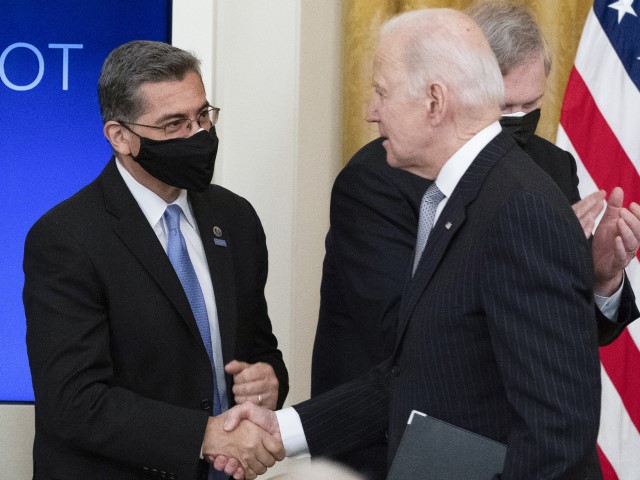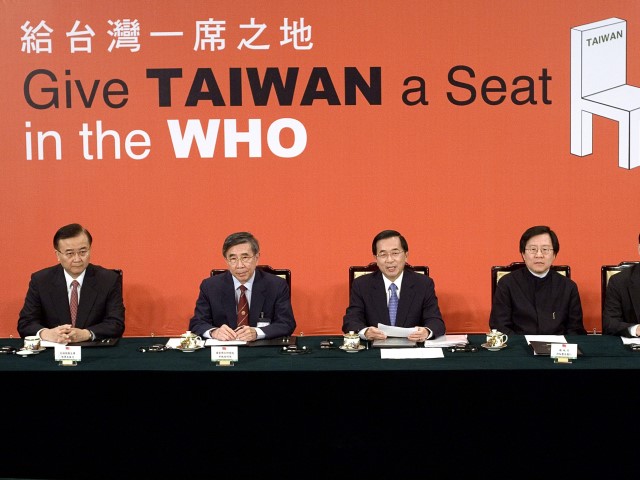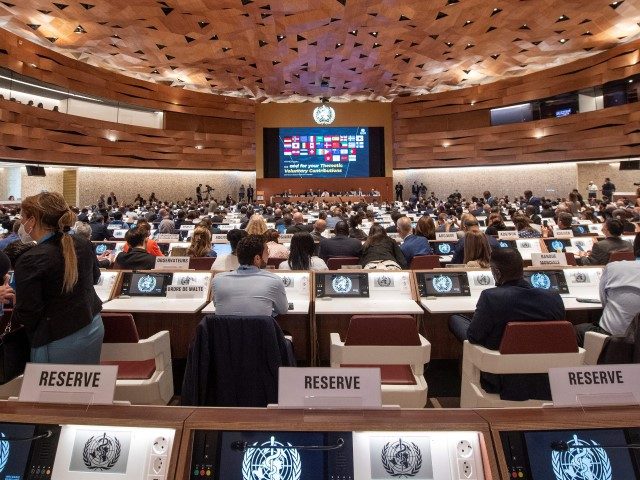According to a flustered report at the Washington Post on Sunday, the World Health Organization (W.H.O.) might not be able to muster the support it needs for a sweeping “global pandemic treaty” at the World Health Assembly currently in progress, but amendments proposed by the Biden administration to reduce the influence of member state governments over W.H.O.’s disease outbreak declarations are still on the table.
The Washington Post grumbled that W.H.O. is facing a “visceral, passionate online backlash that falsely accuses the World Health Organization of conspiring to take power from national governments.”
The article treated concerns about damage to national sovereignty from a pandemic treaty or W.H.O. rules changes as wholly irrational, the work of “conspiracy theorists” in the U.S., Canada, and Europe whose “fear-mongering” is “so far-fetched that they are an inversion of reality.”
There is also some backlash from Russia and China, where critics claim W.H.O. reforms could be a power grab by Western countries hoping to undermine authoritarian regimes.
Lodged in this sea of invective were acknowledgments that the great global pandemic treaty will not be coming up for a vote at this year’s World Health Assembly, or even reaching its final form. The “backlash” against the potential loss of national sovereignty, and well-founded concerns about the competence and honesty of W.H.O., would appear to be having some impact on the World Health Assembly.
The amendments to the International Health Regulations (IHR) proposed by the Biden administration in January are a separate, but related, issue. Biden’s IHR amendments would strike out the existing requirement for W.H.O. to consult with member state governments before declaring outbreak emergencies at the local, national, or global level.

Health and Human Services Secretary Xavier Becerra, left, shakes hands with President Joe Biden after an event in the East Room of the White House, Wednesday, Feb. 2, 2022. Becerra is head of the United States delegation to the World Health Assembly. (Alex Brandon/AP)
The U.S. delegation fast-tracked these IHR amendments for consideration at this year’s World Health Assembly. The amendments would be much easier to implement than a sweeping “global pandemic treaty,” and include some other provisions that could prove more popular and less controversial than granting unilateral authority for emergency declarations to the W.H.O.
For example, one of the proposed changes requires both W.H.O. and member state governments to share all available information about public health threats within 48 hours of an emergency declaration. Another IHR revision would create a “yellow alert” status, a step below the stringent conditions for declaring a full-blown pandemic.
These ideas are appealing to some W.H.O. members because the Chinese Communist Party inflicted horrendous damage on the rest of the world by concealing, and then downplaying, the Chinese coronavirus for as long as possible. The bitter irony is that no rational observer should believe selfish tyrannies like China and Russia would change their behavior because W.H.O. changes its rules.
China’s refusal to deal fairly under the existing W.H.O. rules, and W.H.O.’s reluctance to call Beijing out for it, are global scandals that should never be forgotten. No doubt supporters of the IHR amendments and global pandemic treaty have China in mind, but it is sheer folly to believe China will play along with any rules or treaties that would embarrass the regime in Beijing or compromise its interests. American and European sovereignty might be on the table for compromise, but Chinese sovereignty absolutely is not.
On Monday, China once again blocked Taiwan from regaining its observer status at the World Health Assembly – another demonstration of the malevolent Chinese government’s undue influence over the W.H.O., and a stinging rebuke to those who imagine Beijing would feel any obligation to play along with tougher pandemic rules.

In this May 11, 2007, file photo, then Taiwan’s President Chen Shui-bian, center, answers questions from Geneva-based journalists during a video conference where he protested the World Health Organization’s rejection of the island’s latest bid for membership, at the Presidential Palace in Taipei, Taiwan. Taiwan has called repeatedly for it to be allowed to participate in the W.H.O., from which it has been barred by China. So strong is China’s diplomatic pressure that Taiwan can no longer take part in the organization’s annual World Health Assembly, even as an observer. (AP Photo, File)
“China’s repeated use of politics to override the public interest of global health security and harm the health and human rights of the Taiwanese people is unacceptable to the Ministry of Foreign Affairs,” the Taiwanese government said on Monday. There are good reasons to be wary of granting more authority to a World Health Organization where the political demands of the Chinese Communist Party are prioritized above the health of millions of Taiwanese citizens.
Defenders of the global pandemic treaty and IHR amendments claim there is nothing to fear because W.H.O. does not have enforcement powers. Even if it gains unilateral authority to declare health emergencies, they say, it would have no power to force local, state, or national governments to do anything, nor to punish them for disregarding W.H.O.’s instructions.
This argument requires a leap of faith to believe — that ceding unilateral authority to W.H.O. would not be followed by demands to give it more power. The first time instructions from the World Health Organization were disregarded by a local or national government during a declared health emergency, the calls for punitive sanctions and enforcement powers would become deafening.
Even without any further treaties or rules changes, W.H.O. commands a great deal of financial and political resources, and powerful globalist organizations have a knack for influencing the politics of free nations, even as authoritarian regimes ignore them.
One has only to remember the social and political turbulence of the coronavirus pandemic in the United States to imagine what kinds of hell could be unleashed by a clash between W.H.O. leadership and the governor of a state who disagreed with their judgment.
For instance, Florida Governor Ron DeSantis said on Monday there is “no way” his state would ever support a global pandemic treaty. If W.H.O. unilaterally declared a health emergency in Florida, under either Biden’s proposed IHR amendments or a global pandemic treaty, and the government of Florida resisted, an interstate political war would break out. Politicians in Washington and some other state capitals, and their allies in private corporations, would find ways to punish Florida for defying the World Health Organization’s authority.
For another example, consider how the Paris climate accords are not a duly ratified treaty, but major political factions in the United States behave as though they are, and sought to make the Kyoto Protocols binding before Paris.
Once authority has been established, power tends to follow. That is one reason why placing authority beyond the reach of American voters is dangerous. W.H.O. Director-General Tedros Adhanom Ghebreyesus secured a second term while running unopposed on Tuesday. Americans who disapprove of his performance would have no recourse to vote him out of office.
The Chinese coronavirus pandemic created an understandable desire for stronger, faster worldwide response mechanisms to deal with the next comparable threat. The places from which the next pandemic is likely to spring are unlikely to play along with tighter rules or global treaties.
Responsible nations are not irrational to be concerned about granting more money and authority to a World Health Organization whose performance during the Chinese coronavirus was questionable in many respects – and which has proven, like so many other U.N. agencies, to be highly resistant to reform and accountability.

COMMENTS
Please let us know if you're having issues with commenting.